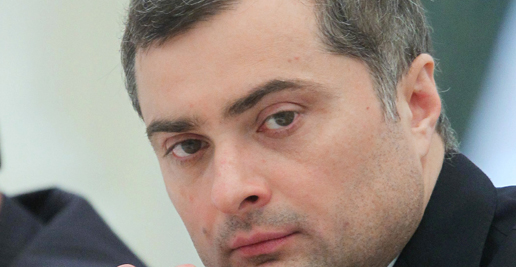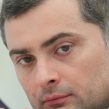
What Surkov’s Ousting Signifies About Russia’s Course in Syria
Publication: Eurasia Daily Monitor Volume: 10 Issue: 90
By:

Russia has captured much political attention in the West in the last few days because of its allegedly central role in the deadlocked civil war in Syria. Yet, in the domestic debates—boiling hot despite the holiday season—Syria is barely present, while the major point of contention is the sacking of Deputy Prime Minister Vladislav Surkov. No direct connection between these two foci of anxiety could possibly exist, but United States Congressman Tip O’Neill’s word of wisdom about all politics being local is perfectly applicable to Russia, in which foreign policy is largely driven by the surging intrigues in the Kremlin. Surkov used to be a grandmaster of these intrigues and the circumstances of his abrupt departure remain a mystery, which might, nevertheless, shed light on the limits of flexibility in Russia’s remarkably rigid course in the Syrian calamity.
It was US Secretary of State John Kerry who opened a new round of diplomatic talks around Syria while visiting Moscow last week and agreeing on staging an international conference, perhaps already in late May, where an interim Syrian government could be formed (Gazeta.ru, May 8). Kerry may not have expected that the first country expressing readiness to take part would be Iran, and he cannot seriously expect that Moscow would impress upon Damascus the desirability of removal of President Bashar al-Assad for the success of this conference (RIA Novosti, May 10). Russian Foreign Minister Sergei Lavrov then traveled to Warsaw for a meeting with his Polish and German counterparts and clarified that the planned delivery of Russian S-300 surface-to-air missiles to Syria would be in accordance with an old contract and could not constitute any violation of international law (Rossiiskaya Gazeta, May 11). Putin, meanwhile, had an unscheduled meeting with British Prime Minister David Cameron in Sochi and assured his guest that despite the still existing disagreements, Russia shared the goal of terminating the conflict and was ready to contribute to “positive scenarios” (Newsru.com, May 10). The fact of the matter is, however, that the protracted humanitarian disaster in Syria has strengthened Russia’s profile on the international arena and so has already constituted a “positive scenario,” as far as Moscow is concerned.
For the Kremlin, the bottom line regarding the Syria crisis is that a ruler has the right to use military force to secure stability in his domain and the responsibility to crush a revolution of any color at whatever cost; and the situation in Russia underpins this proposition. Surkov was considered to be a mastermind of the strategy of pre-empting a revolution by means of sponsoring various pro-Putin youth movements and quasi-non-governmental organizations (NGO), dividing and manipulating the opposition, as well as employing modern technologies of disinformation and deception in the official propaganda (Moscow Echo, May 10). His design of “managed democracy” appeared to work just fine up until the sudden eruption of street protests in Moscow in late 2011, whereas the spoiled presidential inauguration in early May 2012 convinced Putin that the “games” with the opposition had gone too far (Forbes.ru, May 8). Instead of soft manipulations and use of spoilers for compromising the liberal discourse, cruder means of suppression and prosecution were to be prioritized—and Surkov became redundant (Ezhednevny Zhurnal, May 8).
The irony of this political demise is that in Dmitry Medvedev’s cabinet, Surkov was considered one of the more liberal “heavyweights,” who tried to preserve the remnants of the discarded vision of “modernization” and to implement the plan for building an “innovation village” in Skolkovo (RIA Novosti, Gazeta.ru, May 8). His sacking is seen as revenge by such Kremlin “hawks” as Sergei Ivanov, who hates Surkov for the scheme of appointing Medvedev as caretaker-president in 2008, and Vyacheslav Volodin, who supervises the series of “show trials” over such malcontents as fierce anti-corruption blogger Alexei Navalny (Polit.ru, May 8). It is entirely possible, however, that Surkov orchestrated his own fall from grace, preferring to jump the boat with a modicum of dignity (Kommersant, May 8). He understands the risk of being too smart by half but cannot force himself to show dumb loyalty to the regime that has turned ridiculously anti-modern and demonstratively anti-intellectual (Slon.ru, May 8). Surkov was also involved in shaping the Russian-US “reset” during Medvedev’s presidency and chaired, together with Michael McFaul (now the US Ambassador to Russia), one of the joint working groups, but Putin has cut him out of the small circle of trusted lieutenants that drafts responses to the Obama administration’s current advances.
Syria may be of only marginal interest to Putin’s courtiers, but they are not inclined to treat it as a bargaining chip, simply because they do not see any need to bargain with the US. The value of the newly-upgraded dialogue with Washington for them is primarily in establishing the fact of Obama’s readiness to accept Russia’s harsh repressions against the pro-Western opposition with only pro forma complaints. Putin is also keen to undermine the legitimacy of humanitarian interventions and to demonstrate that the West has neither appetite nor capacity for intervening in the war that the al-Assad regime wages against the Syrian people. The trick of announcing the delivery of surface-to-air missiles to Syria is intended to affirm that Russia would not accept a unilateral enforcement of a “no-fly zone” over Syria by the North Atlantic Treaty Organization (NATO). And Prime Minister Benjamin Netanyahu, who explained to Putin a week ago in a telephone conversation the purpose of Israeli air strikes on Damascus, now feels compelled to come to Moscow to negotiate a postponement of the deployment of S-300 batteries (RIA-Novosti, 11 May).
Putin rather enjoys the privilege of the position of indispensable power, which is created not by Russia’s particular strength but by the weakness of the West, which, in his opinion, is set to deepen. There is, however, a serious flaw in Russia’s position, since finding a solution for the violent state failure in Syria is not useful for upholding Moscow’s privileged role. As the domestic situation in Russia deteriorates and squabbles in Putin’s court claim the heads of moderates, the incentives for making deals with the West evaporate. When clinging to power becomes the sole objective, the rationale for foreign policy maneuvers narrows to deterring suspected interference in the struggle with the specter of revolution. And for Russia, there is hardly any space in this “deterrence by dialogue” for a meaningful new “reset.”




